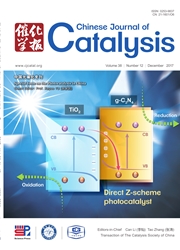

 中文摘要:
中文摘要:
金纳米颗粒在烯烃加氢、水气转化、过氧化氢直接合成和醇类选择性氧化等反应中表现出独特的催化性能,引起了人们广泛关注.通常,金纳米颗粒的催化活性受到尺寸、原子堆积形式、暴露晶面及其与载体的相互作用所影响.而金纳米颗粒的烧结往往导致其催化效率迅速下降.为了解决金颗粒烧结问题,提高其使用寿命,必须控制高温处理时颗粒和原子的迁移.尽管已有很多工作见诸报道,然而到目前为止,仍未完全解决金颗粒烧结问题.本文通过调整有机模板剂和反应温度成功地合成了不同窗口尺寸的立方介孔氧化硅材料(FDU一12),并将预先合成的3nm金颗粒负载于其上,考察了窗口尺寸对金颗粒烧结的影响.首先,采用小角X射线散射、氮气吸附一脱附、透射电镜和扫描电镜等手段证实成功合成了具有亚5 nm窗口的FDU一12材料,同时以3 nm金颗粒为探针,进一步区分了具有〈3 nm和3–5nm窗口的FDU一12样品.在抗烧结实验中发现,具有3–5 nm窗口尺寸的FDU一12能够在一个较宽的金负载量(1.0–8.3 wt%)下稳定金纳米颗粒.在550 ℃空气中焙烧5 h后,金颗粒的平均尺寸维持在4.5–5.0 nm.更小的窗口尺寸则会导致3 nm金颗粒无法进入FDU一12孔道,从而带来低的负载能力和差的抗烧结性能.另一方面,具有〉7 nm窗口尺寸的FDU一12则只在高的金颗粒负载量(〉9 wt%)下才表现出较好的抗烧结性能,低负载量时烧结严重(2.1 wt%,14.2±5.5 nm).我们推测,合适的窗口尺寸(3–5 nm)恰好能允许3 nm金颗粒进入FDU一12的孔道,在高温处理过程中,当金颗粒长大到5nm左右时,窗口极大地限制了金颗粒的移动,导致其不能在孔与孔之间自由迁移.此外,该FDU一12材料的孔径为18 nm,这使得封装在各个孔内部的金颗粒与其他金颗粒距离较远,不利于其通过原子迁移而发生烧结.因此,拥有3–5 nm窗口尺寸的FDU一12在一?
 英文摘要:
英文摘要:
Stabilizing gold nanoparticles(AuNPs) within a desired size range is critical to realize their promising catalytic performance in many important reactions.Herein,we investigate the anti-sintering properties of cubic mesoporous silica(FDU-12) as a function of pore entrance size.Simple adjustments to the type of organic template and reaction temperature enable the successful synthesis of FDU-12 with controllable entrance sizes( 3,3-5 and 7 nm).Excellent anti-sintering properties are observed for FDU-12 with a sub-5-nm entrance size(3-5 nm) over a wide loading concentration(1.0-8.3 wt%) and the AuNPs can be stabilized within a 4.5-5.0-nm range after calcination at 550 ℃in air for 5 h.Smaller entrance size( 3 nm) prevents ingress of 3-nm AuNPs to the mesopores and results in low loading capacity and sintering.Conversely,FDU-12 possessing a larger entrance size(7 nm) shows promising anti-sintering properties at high loading concentrations,although catalytic performance is significantly lost at lower concentrations(e.g.2.1 wt%,14.2 ± 5.5 nm).Different anti-sintering mechanisms are proposed for each of the different FDU-12 entrance sizes.Additionally,catalytic data indicates that the obtained 4.5-nm AuNPs supported on FDU-12 with a sub-5-nm entrance size exhibit excellent mass-specific activity(1544 mmol g_(Au)~(-1) h~(-1)) and selectivity( 99%)at 230 ℃ for the gas-phase selective oxidation of cyclohexanol.
 同期刊论文项目
同期刊论文项目
 同项目期刊论文
同项目期刊论文
 A General Synthetic Strategy to Ordered, Extra-large Mesoporous Metal Oxides via Uniform Sol-gel Coa
A General Synthetic Strategy to Ordered, Extra-large Mesoporous Metal Oxides via Uniform Sol-gel Coa Well-dispersed Bimetallic Nanoparticls confined in Mesoporous Metal Oxides and Their Optimized Catal
Well-dispersed Bimetallic Nanoparticls confined in Mesoporous Metal Oxides and Their Optimized Catal A general synthesis strategy of multi-metallic nanoparticles within mesoporous titania via in situ p
A general synthesis strategy of multi-metallic nanoparticles within mesoporous titania via in situ p In situ generated thrombin in the protein corona of zeolites: Relevance of the functional proteins t
In situ generated thrombin in the protein corona of zeolites: Relevance of the functional proteins t An ordered, extra-large mesoporous ceramic acid with strong Bronsted acid sites and excellent therma
An ordered, extra-large mesoporous ceramic acid with strong Bronsted acid sites and excellent therma Surface group mediates the adsorption of in situ generated thrombin and its interaction with anti-th
Surface group mediates the adsorption of in situ generated thrombin and its interaction with anti-th A general synthesis of mesoporous metal oxides with well - dispersed metal nanoparticles via a versa
A general synthesis of mesoporous metal oxides with well - dispersed metal nanoparticles via a versa Ordered , Extra - Large Mesopores with Highly Loaded Gold Nanoparticles : A New Sintering - and Coki
Ordered , Extra - Large Mesopores with Highly Loaded Gold Nanoparticles : A New Sintering - and Coki Understanding the High Photocatalytic Activity of ( B , Ag )- Codoped TiO2 under Solar-Light Irradia
Understanding the High Photocatalytic Activity of ( B , Ag )- Codoped TiO2 under Solar-Light Irradia Dioxygen activation at room temperature during controllable and highly efficient acetaldehyde-to-ace
Dioxygen activation at room temperature during controllable and highly efficient acetaldehyde-to-ace Origin of the high activity of mesoporous CeO2 supported monomeric VOx for low-temperature gas-phase
Origin of the high activity of mesoporous CeO2 supported monomeric VOx for low-temperature gas-phase Solid phase metallurgy strategy to sub-5 nm Au-Pd and Ni-Pd bimetallic nanoparticles with controlled
Solid phase metallurgy strategy to sub-5 nm Au-Pd and Ni-Pd bimetallic nanoparticles with controlled Well-dispersed bimetallic nanoparticles confined in mesoporous metal oxides and their optimized cata
Well-dispersed bimetallic nanoparticles confined in mesoporous metal oxides and their optimized cata Platinum nanoparticles supported on Ca(Mg)-zeolites for efficient room-temperature alcohol oxidation
Platinum nanoparticles supported on Ca(Mg)-zeolites for efficient room-temperature alcohol oxidation 期刊信息
期刊信息
